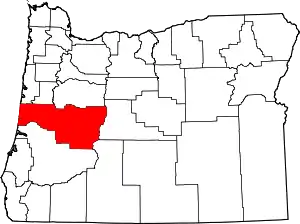Junction City, Oregon
Junction City is a city in Lane County, Oregon, United States. As of the 2020 United States Census, it has a population of 6,747.[2]
Junction City, Oregon | |
|---|---|
City | |
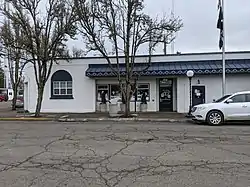 City Hall | |
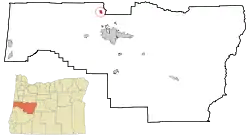 Location in Oregon | |
| Coordinates: 44°13′14″N 123°12′15″W | |
| Country | United States |
| State | Oregon |
| County | Lane |
| Incorporated | 1872 |
| Government | |
| • Type | Council-Manager |
| • Mayor | Beverly Ficek |
| Area | |
| • Total | 3.30 sq mi (8.54 km2) |
| • Land | 3.30 sq mi (8.54 km2) |
| • Water | 0.00 sq mi (0.00 km2) |
| Elevation | 325 ft (99.1 m) |
| Population | |
| • Total | 6,787 |
| • Density | 2,058.54/sq mi (794.77/km2) |
| Time zone | UTC−08:00 (Pacific) |
| • Summer (DST) | UTC−07:00 (Pacific) |
| ZIP Code | 97448 |
| Area code | 541 |
| FIPS code | 41-38000[3] |
| GNIS feature ID | 1166668[4] |
| Website | www.junctioncityoregon.gov |
The Junction City area is notable for its Scandinavian heritage, with the city's Scandinavian Festival attracting over 100,000 visitors annually.[5] Junction City was previously a center of recreational vehicle manufacturing.[5]
History
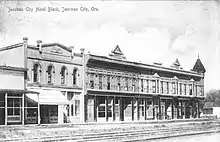
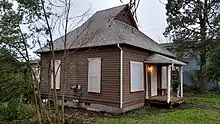
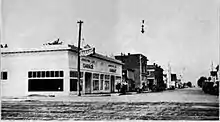
The city was incorporated in 1872.[6] Junction City was named by railroad magnate Ben Holladay, who decided that it would be where the rail line on the east side of the Willamette Valley would meet the rail line on the west side. The westside line, however, was not built according to plan and the rail junction never materialized.[5] Junction City later became the meeting point of the east and west branches of U.S. Route 99 (which divide in Portland).
In 1902, real estate developer A.C. Nielsen subdivided 1,600 acres of farmland near Junction City into small farms and advertised them in a Danish-language newspaper in Iowa.[5][7] Many families of Danish ancestry subsequently settled in the area. Danish was spoken regularly in the area until the 1940s, with Lutheran Church services offered in Danish until 1951.[8] In 1961, residents of Junction City founded the Scandinavian Festival, an annual event that remains popular to this day, to celebrate the legacy of these and other Scandinavian immigrants to the Junction City area.
In the early 1990s, Junction City voters considered two ballot initiatives aimed at restricting LGBT civil rights.[9][10] The initiatives sought to ban the city government from enforcing civil rights protections based on sexual orientation and prohibited public money from being spent to “promote” homosexuality.[10][11] The first ballot initiative was narrowly passed by voters on June 29, 1993, by a vote of 631 to 628 (50.12% in favor).[12] The election was subsequently invalidated due to evidence of voter fraud by supporters.[13] Litigation led by the ACLU of Oregon showed that a Junction City church had allowed several members of their congregation who did not live in Junction City to fraudulently register to vote in Junction City by claiming the church was their residential address.[13] A similar initiative was placed before voters again in March 1994 and passed with a larger margin.[9] In 1995, all Anti-LBGT local ordinances in Oregon were invalidated when the Oregon Supreme Court upheld House Bill 3500.[10]
From 2003 to 2005, a group of local farmers posed for nude calendars to raise money for the Junction City School District.[14] Sales in over 63 countries raised more than $650,000.[15]
Geography
According to the United States Census Bureau, the city has a total area of 2.36 square miles (6.11 km2), all of it land.[16]
Climate
This region experiences warm (but not hot) and dry summers, with no average monthly temperatures above 71.6 °F (22 °C). According to the Köppen Climate Classification system, Junction City has a warm-summer Mediterranean climate, abbreviated "Csb" on climate maps.[17]
Demographics
| Census | Pop. | Note | %± |
|---|---|---|---|
| 1880 | 428 | — | |
| 1900 | 506 | — | |
| 1910 | 759 | 50.0% | |
| 1920 | 687 | −9.5% | |
| 1930 | 922 | 34.2% | |
| 1940 | 1,187 | 28.7% | |
| 1950 | 1,475 | 24.3% | |
| 1960 | 1,614 | 9.4% | |
| 1970 | 2,373 | 47.0% | |
| 1980 | 3,320 | 39.9% | |
| 1990 | 3,670 | 10.5% | |
| 2000 | 5,132 | 39.8% | |
| 2010 | 5,392 | 5.1% | |
| 2020 | 6,787 | 25.9% | |
| U.S. Decennial Census[18][2] | |||
2020 census
As of the 2020 Census,[19] there were 6,787 people in the city and the population density was 2,065 inhabitants per square mile (797.3/km2). There were 2,704 housing units at an occupancy rate of 96.2%. The racial makeup of the city was 92.2% White, 1.7% Black or African American, 5.2% Native American, 2.4% Asian, 0.5% Pacific Islander, and 7.5% from other races. Hispanic or Latino of any race were 9.9% of the population.
2010 census
As of the census[20] of 2010, there were 5,392 people, 2,184 households, and 1,394 families living in the city. The population density was 2,284.7 inhabitants per square mile (882.1/km2). There were 2,323 housing units at an average density of 984.3 per square mile (380.0/km2). The racial makeup of the city was 90.4% White, 0.7% African American, 1.3% Native American, 0.6% Asian, 0.1% Pacific Islander, 3.7% from other races, and 3.2% from two or more races. Hispanic or Latino of any race were 9.0% of the population.
There were 2,184 households, of which 33.3% had children under the age of 18 living with them, 45.0% were married couples living together, 13.0% had a female householder with no husband present, 5.8% had a male householder with no wife present, and 36.2% were non-families. 28.4% of all households were made up of individuals, and 13.8% had someone living alone who was 65 years of age or older. The average household size was 2.43 and the average family size was 2.93.
The median age in the city was 36 years. 25% of residents were under the age of 18; 9.1% were between the ages of 18 and 24; 26.4% were from 25 to 44; 24.4% were from 45 to 64; and 15.1% were 65 years of age or older. The gender makeup of the city was 47.8% male and 52.2% female.
2000 census
As of the census[3] of 2000, there were 4,721 people, 1,823 households, and 1,170 families living in the city. The population density was 3,405.1 inhabitants per square mile (1,314.7/km2). There were 1,921 housing units at an average density of 1,385.5 per square mile (534.9/km2). The racial makeup of the city was 91.21% White, 0.30% African American, 1.23% Native American, 0.59% Asian, 0.04% Pacific Islander, 3.66% from other races, and 2.97% from two or more races. Hispanic or Latino of any race were 8.28% of the population. There were 1,823 households, out of which 34.4% had children under the age of 18 living with them, 50.5% were married couples living together, 10.1% had a female householder with no husband present, and 35.8% were non-families. 30.5% of all households were made up of individuals, and 16.5% had someone living alone who was 65 years of age or older. The average household size was 2.51 and the average family size was 3.15.
In the city, the population was 27.1% under the age of 18, 10.5% from 18 to 24, 27.9% from 25 to 44, 19.6% from 45 to 64, and 14.9% who were 65 years of age or older. The median age was 34 years. For every 100 females, there were 92.1 males. For every 100 females age 18 and over, there were 88.5 males.
The median income for a household in the city was $35,347, and the median income for a family was $43,875. Males had a median income of $31,044 versus $21,757 for females. The per capita income for the city was $16,155. About 6.3% of families and 8.8% of the population were below the poverty line, including 11.7% of those under age 18 and 14.5% of those age 65 or over.
Economy
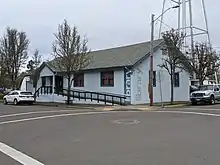
Junction City is located in the bottom of the Willamette Valley, close to the Willamette River, an extremely fertile agricultural region.[21] Hazelnuts, hay, grass seed, nursery crops, Christmas trees, sheep, and dairy products are the major agricultural products of the area.[22] Junction City is also located in a growing wine region. The Lower Long Tom American Viticulture Area (AVA), establish in 2021, is located primarily in the Junction City area.[23]
Junction City is home to a number of prominent agricultural businesses. Lochmead Farms, a dairy headquartered in the city, was awarded the top dark chocolate ice cream and the second-best vanilla ice cream at the 2018 World Dairy Expo in Wisconsin.[24] Lochmead Farms operates a chain of 44 Dari Mart convenience stores throughout the south Willamette Valley. The Eugene Livestock Auction, the largest in western Oregon, is also located in Junction City.[25]
Junction City was a center of the RV and motorcoach manufacturing in the 20th Century, with the nickname "The RV Manufacturing Capital of the World."[5] The city was the home of Country Coach, a large luxury motorcoach manufacturer employing over 2,000 people. Country Coach was liquidated in February 2010 after filing for bankruptcy.[26][27] It was also the home of Monaco Coach Corporation and Marathon Coach prior to their move to nearby Coburg. Similarly, Guaranty RV Super Center of Junction City was the largest RV dealership in the U.S. No RV or motorhome manufacturers remain in Junction City following the Great Recession.[5]
In March 2015, the Oregon State Hospital opened a Junction City campus with the capacity to serve up to 174 people with severe mental illness.[28]
Arts and culture
Annual events
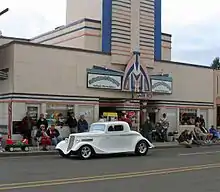
- The Scandinavian Festival occurs annually in mid-August and features traditional Scandinavian costumes, crafts, and folk dance.[29]
- The Daffodil Drive Festival is a two-day event held annually in mid-March, featuring a 6-mile (9.7 km) driving route heavily planted with daffodils extending from Junction City to the Long Tom Grange Hall.[30][31]
- The "Function 4 Junction" is a two-day classic car show and cruise held annually in June.[32]
- The Highway 36 "52-Mile Yard Sale" is a three-day event held annually in late June in which many yard sales are held along the 52-mile length of Oregon Route 36, which extends from Junction City to Mapleton in the Oregon Coast Range.[33] Founded in 2004, the event is patterned after the 127 Corridor Sale in the Tennessee area.[34]
Education
The city is served by the Junction City School District, which includes Junction City High School. Junction City is also located in the Lane Community College District.
Notable people
- James A. Bushnell, first Chairman of the board of Bushnell University[35]
- Charity Dean, disease control expert and assistant director of California's Department of Public Health
- Bobby Doerr, Major League Baseball player, member of National Baseball Hall of Fame and Museum
- Kate Elliott, fantasy and science fiction writer
- Ty Harden, Major League Soccer player
- Eric Hays, basketball player and coach
- Buster B. Jones, American fingerpicking-style guitar player
- Derek Humphry, founder of the Hemlock Society
- Walter McClure, track and field athlete
- Dmae Roberts, public radio producer, writer, actress, and playwright
- Dave Wilcox, American football player, member of Pro Football Hall of Fame
- Justin Wilcox, American football coach
- John N. Williamson, politician
References
- "ArcGIS REST Services Directory". United States Census Bureau. Retrieved October 12, 2022.
- "Census Population API". United States Census Bureau. Retrieved October 12, 2022.
- "U.S. Census website". United States Census Bureau. Archived from the original on July 9, 2021. Retrieved January 31, 2008.
- "US Board on Geographic Names". United States Geological Survey. October 25, 2007. Archived from the original on February 12, 2012. Retrieved January 31, 2008.
- "Junction City, OR History". Archived from the original on December 10, 2022. Retrieved December 10, 2022.
- "Names of Lane County Communities Reveal Interesting Histories, Anecdotes". Eugene Register-Guard. January 4, 1942. p. 4. Archived from the original on January 2, 2022. Retrieved April 23, 2015.
- Rasmussen, Gerald; Larsen, Otto (1998). "Oregon Danish Colony: Ethnic Assimilation In Junction City, 1902-1952". The Bridge. 22 (2). Retrieved December 10, 2022.
- "Faith Lutheran Church History". Archived from the original on December 11, 2022. Retrieved December 10, 2022.
- "Anti-Gay Ballot Initiatives Prior to Romer v. Evans". Archived from the original on December 10, 2022. Retrieved December 10, 2022.
- "Oregon's other gay record". Street Roots. Archived from the original on December 10, 2022. Retrieved December 10, 2022.
- Egan, Timothy. "Voters in Oregon Back Local Anti-Gay Rules". New York Times. Archived from the original on May 26, 2022. Retrieved December 10, 2022.
- "Lane County Elections Archive". Archived from the original on December 10, 2022. Retrieved December 10, 2022.
- "Oral History Interview with Diane DePaolis". Archived from the original on December 10, 2022. Retrieved December 10, 2022.
- "Men Drop Their Drawers for Local Schools". Fox News. March 25, 2015. Archived from the original on September 28, 2022. Retrieved January 15, 2016.
- Cole, Katherine. "Oregon winery owner's astonishing past life reads like fast-moving fiction: Wine notes". The Oregonian. Archived from the original on August 12, 2022. Retrieved December 11, 2022.
- "US Gazetteer files 2010". United States Census Bureau. Archived from the original on July 2, 2012. Retrieved December 21, 2012.
- "Junction City, Oregon Köppen Climate Classification". Weatherbase. Archived from the original on March 3, 2016. Retrieved September 28, 2022.
- "Census of Population and Housing". United States Census Bureau. Archived from the original on July 1, 2021. Retrieved June 4, 2015.
- "2020 Census Profiles Oregon Cities Alphabetically H - L" (PDF). Portland State University. Retrieved December 10, 2022.
- "U.S. Census website". United States Census Bureau. Archived from the original on July 9, 2021. Retrieved December 21, 2012.
- "Farms and Agriculture". Oregon Explorer. December 10, 2022. Archived from the original on December 11, 2022. Retrieved December 10, 2022.
- "County Profile: Lane County, OR" (PDF). USDA. December 10, 2022. Archived (PDF) from the original on December 11, 2022. Retrieved December 10, 2022.
- "LOWER LONG TOM AVA". Willamette Valley Wine. December 10, 2022. Retrieved December 10, 2022.
- "Junction City-based Lochmead Dairy's ice cream flavors earn top honors". Eugene Register-Guard. Archived from the original on December 11, 2022. Retrieved December 10, 2022.
- "Selected Western Livestock Auctions". Capital Press. Archived from the original on December 11, 2022. Retrieved December 10, 2022.
- Battistella, Edwin. "Country Coach". Archived from the original on December 11, 2022. Retrieved December 11, 2022.
- "RV maker Country Coach's assets sold". February 6, 2010. Archived from the original on December 11, 2022. Retrieved December 11, 2022.
- "Oregon State Hospital celebrates first anniversary of Junction City campus". Oregon Health Authority. March 15, 2016. Archived from the original on March 18, 2016. Retrieved May 16, 2021.
- "Junction City, Oregon's Scandinavian Festival Homepage". Archived from the original on March 17, 2012. Retrieved March 16, 2012.
- "The Daffodil Festival". Archived from the original on June 23, 2016. Retrieved March 16, 2012.
- Adeline Bash (March 16, 2012). "Festival blooms anew after disastrous year". Eugene Register-Guard. Retrieved March 16, 2012.
- "Function 4 Junction Show 'n Shine & Cruises". Retrieved December 11, 2022.
- "52-mile long yard sale? Yes, yes it was". July 2013. Archived from the original on December 11, 2022. Retrieved December 11, 2022.
- "3nd ANNUAL OREGON HIGHWAY 36 YARD and CRAFT SALE". Retrieved December 11, 2022.
- "James A. Bushnell, Prominent Lane Pioneer, Is Dead". Ancestry. The Eugene Guard. April 9, 1912. p. 3. Retrieved August 4, 2023.
